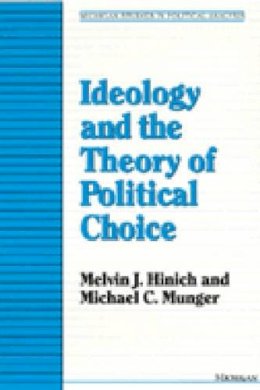
Ideology and the Theory of Political Choice (Michigan Studies in Political Analysis)
Hinich, Melvin J., Munger, Michael C.
There is no unified theory that can explain both voter choice and where choices come from. Hinich and Munger fill that gap with their model of political communication based on ideology.
Rather than beginning with voters and diffuse, atomistic preferences, Hinich and Munger explore why large groups of voters share preference profiles, why they consider themselves "liberals" or "conservatives." The reasons, they argue, lie in the twin problems of communication and commitment that politicians face. Voters, overloaded with information, ignore specific platform positions. Parties and candidates therefore communicate through simple statements of goals, analogies, and by invoking political symbols. ... Read more
Product Details
About Hinich, Melvin J., Munger, Michael C.
Reviews for Ideology and the Theory of Political Choice (Michigan Studies in Political Analysis)
Douglass C. North ". . . represents a significant contribution to the ... Read more
